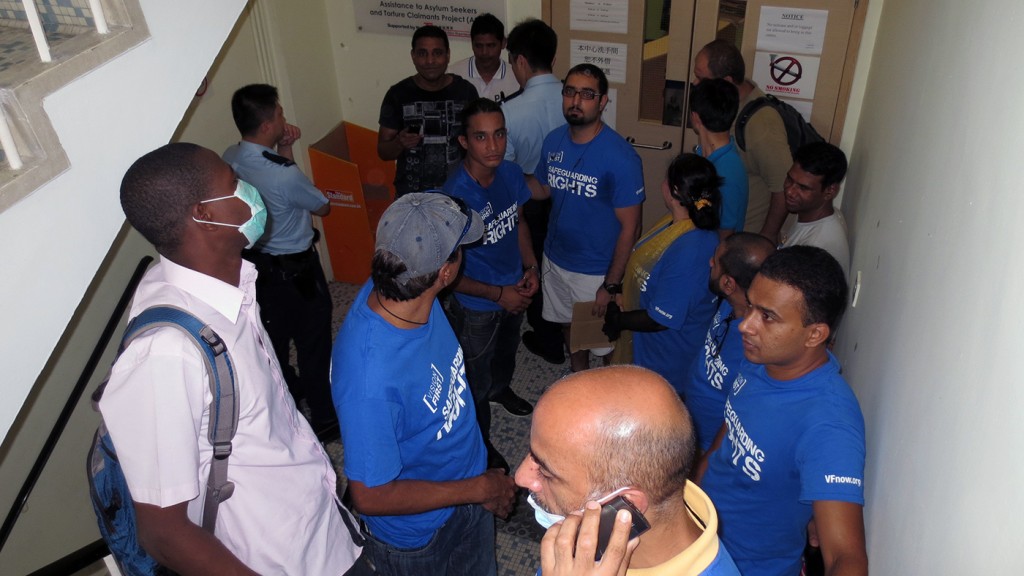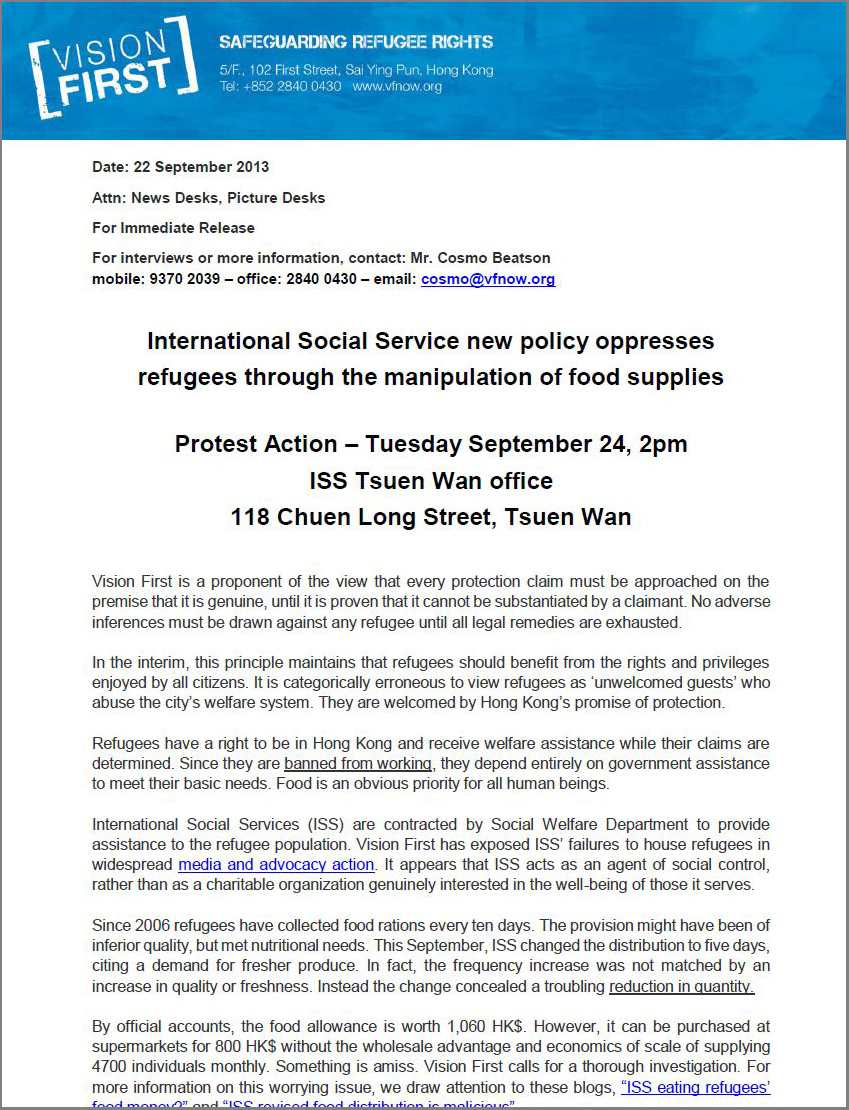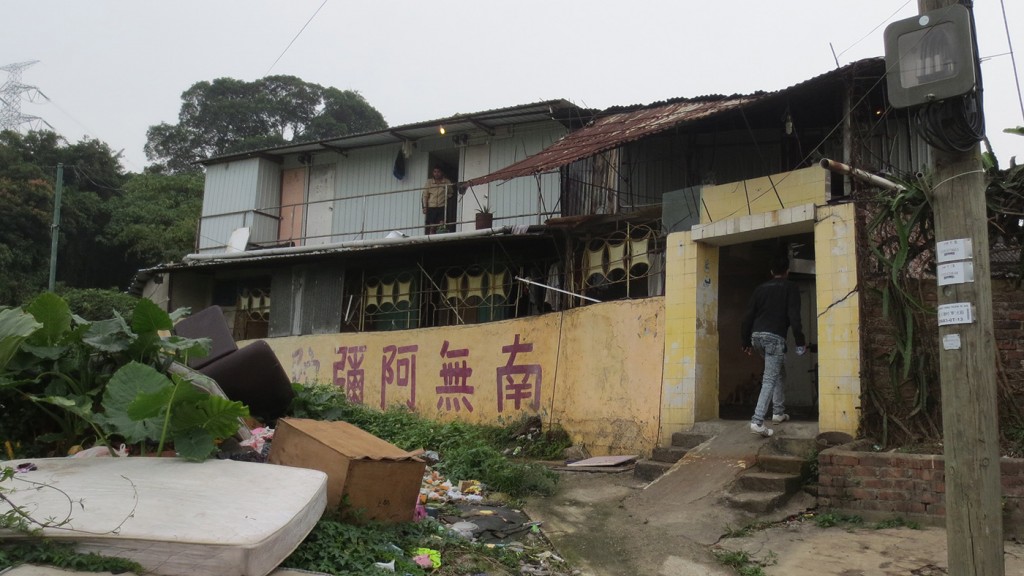Demand letters to Eastweek and HK Standard
Sep 25th, 2013 | Advocacy, Media | Comment
click to read demand letter

click to read demand letter
Government admits putting asylum seekers in homes not fit to live in
Sep 24th, 2013 | Advocacy, Media | Comment
Danny Lee writes for South China Morning Post on 23 September 2013
Welfare department says asylum seekers are housed in non-residential accommodation. But police drop investigation into slum scandal
The Social Welfare Department has admitted its contractor in charge of asylum seekers’ welfare is housing clients in homes not fit to live in. However, police have dropped their investigation into how some asylum seekers came to be living in squalor due to a lack of evidence. A spokeswoman for the department said the contractor, the International Social Service Hong Kong Branch (ISS-HK), had asked more than 110 asylum seekers to move out of accommodation not fit for residential use. The result is a stand-off as clients are refusing to move.
“The ISS-HK has contacted more than 110 asylum seekers and refugees who are living in areas not meant for residential purposes and has been discussing alternative accommodation with them,” the spokeswoman said. “But they all prefer to stay in their current abodes, which they secured themselves. ISS-HK will continue to encourage them to move out and will mobilise the necessary resources to help them.”
It is believed the asylum seekers are reluctant to move because their homes – which would have been subject to ISS-HK approval – are relatively cheap. Even so, they often cost more than the ISS-HK housing allowance, and many of the asylum seekers have found jobs locally, albeit illegally, to help pay the extra cost.
News that police were dropping the investigation into asylum seekers’ living conditions delivered a blow to human rights advocates seeking to overhaul the city’s welfare system for these people. The degrading conditions in which some are living came to light when a man was rushed to hospital after drinking contaminated water. His home was then found to be a stinking old pigeon shed with no drinking water.
A police spokesman said: “The evidence obtained during the investigation has been seriously considered. As there is insufficient evidence to support the commission of any offence by any person, there will be no further investigation at this stage.” Adrielle Panares, ISS-HK’s migrants programme director, insisted no asylum seeker was living in inappropriate housing. “We are continuously monitoring the conditions of the clients, as per our practice. This means that we review each service user’s assistance every month, conduct home visits, and, with the service users, look into addressing their concerns and needs,” she said.
Robert Tibbo, a barrister specialising in human rights cases and a non-executive director of rights group Vision First, said ISS-HK was not taking responsibility. “This effort to move the asylum seekers out of a few identified slums was apparently an ad hoc attempt to make the issue of slums disappear,” he said. “Over many years, ISS has systematically placed asylum seekers into many slums located across Hong Kong.”
The welfare department declined to say how long the practice of accommodating asylum seekers in the makeshift rooms had been going on. A previous investigation by the South China Morning Post found hundreds of asylum seekers living in squalor in outlying areas of the New Territories. Rooms had no toilets or fresh drinking water but were paid for and approved by the ISS-HK.
The ISS-HK receives HK$203 million from the government to pay for asylum seekers’ welfare. The money, which is not given to them directly, covers rent, a pack of groceries every five days and other basic necessities. The budget increased more than 30 per cent this year because of the number of new ISS-HK clients requiring assistance.
![SCMP 23Sep13]](http://visionfirstnow.org/uploads/SCMP-23Sep13-600x481.jpg)
Indian asylum seeker Gupta Raja’s makeshift home at a slum at Nai Wai, Tuen Mun. Photo: Sam Tsang
Testing rotten eggs supplied by ISS
Sep 24th, 2013 | Advocacy | Comment
Eggs distributed to refugees are either rotten or unpleasantly ‘liquid’
Verdict: not fit for consumption!
ISS new policy oppresses refugees through the manipulation of food supplies
Sep 22nd, 2013 | Advocacy, Food, VF updates, programs, events, Welfare | Comment
Against ISS-HK’s malicious food distribution
Sep 15th, 2013 | Advocacy | Comment
Since April 2006 there were complaints about the quantity and mostly the quality of food, but refugees managed to eat sufficiently. Nobody was hungry and meals were balanced. Refugees visited contracted grocery shops three times monthly to collect two bags of groceries with a variety of food groups. There were carbohydrates to eat with proteins and vegetables to cook with other ingredients. Poor quality maybe, but a good mix.
Last night a desperate mother emailed, “It’s more than worse than before with the food provided to me. How can i feed three kids on ten rotten eggs given to me on the first time? And they say the food is fresh. (We collected) 1 liter of milk, 6 packs of juice, 6 pieces of meat and 1 chicken piece”. Another mother called in tears. She complained she had no rice, pasta or bread to feed her hungry children. She said the shop gave her a fish head.
Something is amiss. ISS’ decision to enforce a six-times-a-month food distribution is hard to comprehend. ISS claims refugees requested more frequent collections, namely every 5 vs. 10 days. This however cannot be generally true, given long travelling distances and longer arguments over bus fares. ISS claims this ensures fresher produce, but small heads of lettuce and wilted broccoli fail to justify the aggravation. At best, ISS solved one problem by creating a bigger one!
We were informed by a reliable government source that, “the revised arrangement was proposed in response to previous requests by torture claimants / asylum seekers.” However, one ISS senior manager stated to a refugee that, “we don’t really have any choice and we have to do it six times … I can’t change the government’s policy, right?”
Among conflicting statements, the reality angers refugees and even shop owners. While a refugee collected 10Kg of rice, 500gr of flour and 1 tin of ghee with nothing else, another collects 1 chicken, detergent, coffee, sugar and fruit juice with no staple foods. And yet both had to ration their welfare assistance for five days. Children are worse off with powder milk and cornflakes for breakfast, lunch and dinner for the period. Finally, we are sorry for the mother who collected a dozen rotten eggs!
The facts are astounding. Mothers are crying at collection points, while children cling on in tears. Men shout angrily and refuse to take home what amounts to an insult. One said, “What will I say to my wife?” Meetings are called. Gatherings are forming. Anger is building up to a dangerous point. We measure our words carefully saying that refugees haven’t been pushed so hard against the wall. The reaction is one ISS must take full responsibility for.
This organization (under police investigation) is doing nothing to mitigate a critical situation and reach out to those it should actually enjoy serving. International Social Service has seemingly confused the concept of ‘social service’ with that of ‘social control’. ISS appears to relish inflicting hardship at every opportunity. In fact, it appears this NGO cares nothing about those it serves and persistently disregards the good of its clients by deploying harmful services. ISS doesn’t seem to get anything right lately. Perhaps they never did.

No. 20 – The Slum on the Hilltop
Sep 13th, 2013 | Advocacy, Crime, Housing, Welfare | Comment
In the hills south of Yuen Long are many slums ISS sponsors and supports for refugees. The conversion of animal farms into refugee slums is a striking pattern and a preference for case workers. After the first farmer agreed to house refugees in abandoned sheds, many have followed. It’s been a gold rush of sorts!
This particular location was established over three years ago as the longest resident has been here since 2010, although others have since left. The conditions are primitive and harsh. We were unable to stay longer than a couple of minutes in any baking container. It is reported these once rented for 400$ before landlords learnt about the 1200$ ISS paid for refugees. Since then business is booming and work expansions are everywhere.
Housing refugees is good business and, until recently, nobody cared about falsifying documents. ISS contracts at this location bear a number of addresses that clash spectacularly with the one on the Lands Department notice. It is inexplicable that two refugees share one container while their ISS contracts show “89 Shek Tong Tsuen” and “18 Chuk San Tsuen”. A container straddling two villages – how bizarre!
The living conditions are now familiar to our website viewers. We are no longer shocked or even surprised that ISS case workers approve converted animal sheds for human habitation, well, at least not for themselves and their family. The pattern widens and expands. The ISS case workers who signed contracts in this slum are: Tanya Sze, Tofu Lau, Catherine Chan, Mary Lee and Eric So with several clients each.
It is alarming that the same dozen case workers appear to be managing ISS Slum Policy.
Obvious cases of fraud and theft with conspiracy to defraud by ISS and the landlord?
We have no secrets: asylum aid chief
Aug 28th, 2013 | Advocacy, Media | Comment
Danny Lee writes for South China Morning Post on 28 August 2013
Head of Swiss-based group says it will help police probe into why clients have been living in illegally converted pigeon coop in Tuen Mun
The head of a Swiss-based international aid network has promised his organisation will not block a police probe into why asylum seekers have been housed in a converted pigeon farm. Jean Ayoub, secretary general of International Social Service, was responding to claims that ISS-HK, which looks after the welfare of asylum seekers, had been using taxpayers’ money to provide “inappropriate accommodation”. “In no way will we hide any information if it becomes real evidence,” Ayoub said from Geneva.
He said everyone had a right to give their side of the story, including ISS-HK. If any form of mismanagement came to light it “would be very serious”. But the organisation had never had “this kind of bother” in its 90-year history. ISS-HK is commissioned by the Social Welfare Department to help asylum seekers with housing, food, transport, clothing and other provisions. Last year it received HK$203 million from the government, which caps the monthly rent available for each recipient at HK$1,200.
In recent months, ISS-HK has faced heavy scrutiny from the Vision First rights group, which accuses it of forcing asylum seekers to live in the illegally converted pigeon farm in Tuen Mun that is a “degrading slum unfit for human habitation”. The owner charges HK$1,300 per person. The shed is patched up with tin, chicken wire and wood and has been subdivided into makeshift cubicles. The residents depend on bottled water for drinking and have only cold showers.
One of the eight residents was taken to hospital recently after drinking boiled tap water. Ayoub said it was up to independent directors overseeing ISS-HK to decide whether to suspend any personnel in the wake of the police investigation. “Depending on the seriousness of the allegations, the international board might step in to talk to the national board and seek ways to correct the situation,” he said. Ayoub said the ISS had a comprehensive set of rules and guidelines for its global network of offices to follow.
The inadequate treatment of asylum seekers, refugees and torture claimants was not a problem confined to Hong Kong, he said. “I would understand from a purely political or practical point of view that governments would want to restrict people coming to these countries,” he said. “What we’re saying is when someone is inside, they should be treated with dignity and not be limited by hundreds of Hong Kong dollars.”

SCMP Danny Lee interviews lawmaker Fernando Cheung in the slums
The case for the right to work
Aug 27th, 2013 | Advocacy | Comment
In the aftermath of the refugee welfare crisis, Vision First advocates for the right to work. Radical change that is both meaningful and pragmatic must be rooted in upholding refugee rights and these include employment rights.
Palliative measures remain Band-Aid solutions that mask failed policies that might alleviate some hardship, but offer no lasting solution. It is hoped that the government will consider the bigger picture when brainstorming the way forward. Now is the time for policy-makers to study new ideas.
Granting refugees the right to work eliminates the constraints of a welfare system that will again be found wanting in the face of inflection and the economic pressure of life in a prohibitively expensive city. Assuming the upcoming Unified Screening Mechanism (USM) is fair, efficient and credible, refugees will no longer be waiting 5 to 10 years for decision and average stays will be shorter.
Under the USM umbrella, the government could adopt measures implemented in other developed countries that include a defined period of “waiting on welfare” (say, 6 months) followed by a period of “waiting while working”. How long refugees might work will depend on the efficiency of a screening system that meets the high standards of fairness demanded by society.
Vision First advocates for the right to work that offers advantages including:
- The economic benefit of having productive refugees working in labour-intensive and transnational jobs (that locals cannot perform), which engenders and promotes the city’s spirit of self-reliance.
- The ideology of self-reliance is a cornerstone of the Hong Kong’s economic miracle. Citizens are encouraged to rely on themselves and their connections to survive. Transitional or not, refugees are part of society and nobody benefits by trapping them in a welfare bubble.
- The alignment with very limited welfare assistance for residents. The Comprehensive Social Security Assistance (CSSA) is a narrow safety net for the most vulnerable citizens (80% elderly) who are unable to work. It prevents starvation while encouraging able citizens to strive for a higher standard of living.
- The saving of 203 million dollars spent on a welfare contract. This would save considerable administrative and salary costs as well as the inefficiency of distributing food and other necessities. ISS would be closed down. Refugees would welcome trust, self-reliance and empowerment.
- The direct management of more vulnerable refugees by the government. SWD would care for children, elderly and those unable to work through the current welfare system available to citizens. There would be no more complaints against unfit government contractors.
- The reduced pressure on refugee NGOs, faith and support groups. These organizations would then assist in filling service gaps that are not strictly SWD’ duty. Most refugees would become self-reliant and only depend on NGOs assistance for one-off, non-recurring interventions.
- The resolution of antagonism. Given the right to work, refugees would actively find the means to support themselves and their family. They would no longer be trapped between insufficient assistance and the prohibition to work. They would guide, advice and assist each other.
Granting refugees the right to work removes the need to review the current welfare package. Empowering refugees meets the overarching principles the government strictly abides by and are the economic rock on which Hong Kong was built. In our view, the way forward is the right to work. It may be limited to certain sectors, where labour is in demand and refugees have a clear advantage in generating business opportunities from which the community benefits.
It is well-known that the government prefers economic arguments to those predicated on human rights and social justice. Safeguarding refugee rights, Vision First proposes solutions that are in the best interest of both Hong Kong and refugees. We should ask: What do refugees want, more welfare or the right to work? What does Hong Kong want, to improve economic prospects and social stability or to waste tax dollars in ineffective deterrence and welfare?
The definition of fraud
Aug 25th, 2013 | Advocacy | Comment
Vision First salutes the dawn of truth. Refugees walk on a foundation of facts. ISS’ foundation of deception and abuse is finally cracking. Fraud may be relevant to ISS having made representations to SWD that the refugee slums meet the requirements of the SWD Tender Specification and the SWD – ISS contract. The ISS case workers promoting the slums, leading refugees there, accepting false documents and signing contracts containing false information, might evince a clear deception by ISS on SWD and the HK Government. The truth will come out and anyone criminally liable will be held accountable. Here is the definition of fraud in Hong Kong law:
Theft Ordinance, Chapter 210, Section 16A – Fraud
If any person by any deceit (whether or not the deceit is the sole or main inducement) and with intent to defraud induces another person to commit an act or make an omission, which results either:
(a) in benefit to any person other than the second-mentioned person; or
(b) in prejudice or a substantial risk of prejudice to any person other than the first-mentioned person,
the first-mentioned person commits the offence of fraud and is liable on conviction upon indictment to imprisonment for 14 years.

click image to read the definition of fraud in the Theft Ordinance
Report to police on ISS fraudulent practices
Aug 20th, 2013 | Advocacy | Comment
click image to view report to Hong Kong Police






